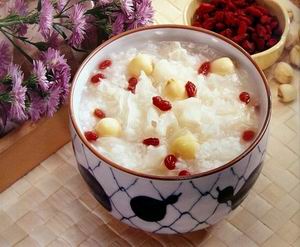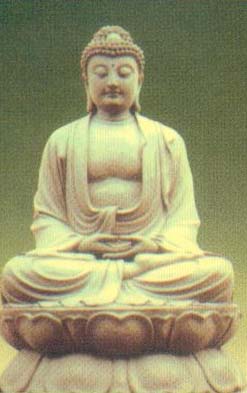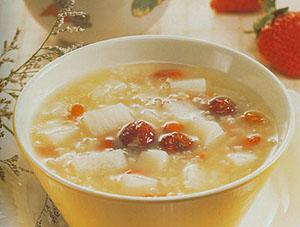January-又到腊八粥飘香
(单词翻译:单击)
|
腊月初八,我国人民有吃腊八粥习俗。据说腊八粥传自印度,和佛教始祖释迦牟尼有关。释迦牟尼本是古印度北部迦毗罗卫国(今尼泊尔境内)净饭王的儿子,他见众生受生老病死等痛苦折磨,又不满当时婆罗门的神权统治,舍弃王位,出家修道。初无收获,后经六年苦行,于腊月八日在菩提树下悟道成佛。在这六年苦行中,每日仅食一麻一米。后人不忘他所受的苦难,于每年腊月初八吃粥以做纪念。“腊八”就成了“佛祖成道纪念日”。腊八粥在古时是用红小豆、糯米煮成,现在在中国各地腊八粥的花样,争奇竞巧,品种繁多。 |
|
|
 Labais celebrated1 on the eighth day of the last lunar month, referring to the traditional start of celebrations for the Chinese New Year. "La" in Chinese means the 12th lunar month and "ba" means eight.
Labais celebrated1 on the eighth day of the last lunar month, referring to the traditional start of celebrations for the Chinese New Year. "La" in Chinese means the 12th lunar month and "ba" means eight.Legends about the origin of this festivity abound2. One holds that over 3,000 years ago sacrificial rites3 called "La "(腊) were held in the twelfth lunar month when people offered their preys4 to the gods of heaven and earth. The Chinese characters for prey5 (猎物) and the twelfth month (腊) were interchangeable then, and ever since "La" has been used to refer to both.
Since the festival was held on the eighth day of the Last month, people later appended the number eight ("ba" in Chinese), giving us the currentLaba.
The majority Han Chinese have long followed the tradition of eating Laba rice porridge on the Laba Festival. The date usually falls in mid-January.
 Legend
Legend
Laba rice porridge(粥) was first introduced to China in the Song Dynasty about 900 years ago. Buddhism6 was well accepted in the areas inhabited by the Han Chinese, who believed thatSakyamuni(释迦牟尼), the first Buddha7 and founder8 of the religion, attained9 enlightenment on the eighth day of the twelfth month.Sutras(佛经)were chanted in the temples and rice porridge with beans, nuts and dried fruit was prepared for the Buddha. With the passing of time the custom extended, especially in rural areas where peasants would pray for a plentiful10 harvest in this way.
Buddhism6 was well accepted in the areas inhabited by the Han Chinese, who believed thatSakyamuni(释迦牟尼), the first Buddha7 and founder8 of the religion, attained9 enlightenment on the eighth day of the twelfth month.Sutras(佛经)were chanted in the temples and rice porridge with beans, nuts and dried fruit was prepared for the Buddha. With the passing of time the custom extended, especially in rural areas where peasants would pray for a plentiful10 harvest in this way.
There is, however, another touching11 story: When Sakyamuni was on his way into the high mountains in his quest(寻求) for understanding and enlightenment, he grew tired and hungry. Exhausted12 from days of walking, he fainted away by a river in India. A shepherdess found him there and fed him her lunch -- porridge made with beans and rice. Sakyamuni was thus able to continue his journey.
After six years of strict discipline, he finally realized his dream of full enlightenment on the eighth day of the twelfth lunar month. Ever since, monks13 have prepared rice porridge on the eve and held a ceremony the following day, during which they chant sutras and offer porridge to Buddha. Thus, the tradition of eating Laba porridge was based in religion, though with the passing of time the food itself became a popular winter dish especially in cold northern China.
According to written records, large Buddhist14 temples would offer Laba rice porridge to the poor to show their faith to Buddha. In the Ming Dynasty about 500 years ago, it became such a holy food that emperors would offer it to their officials during festivals. As it gained favor in the feudal15 (封建的)upper class, it also quickly became popular throughout the country.
 Laba Rice Porridge
Laba Rice Porridge Laba rice porridge containsglutinous16 rice(糯米), red beans, millet17, Chinese sorghum18, peas, dried lotus seeds, red beans and some other ingredients, such as dried dates, chestnut19 meat, walnut20 meat, almond, peanut, etc. Actually eight ingredients(配料、成分) are used, cooked with sugar to make the porridge tasty.
Laba rice porridge containsglutinous16 rice(糯米), red beans, millet17, Chinese sorghum18, peas, dried lotus seeds, red beans and some other ingredients, such as dried dates, chestnut19 meat, walnut20 meat, almond, peanut, etc. Actually eight ingredients(配料、成分) are used, cooked with sugar to make the porridge tasty.
Northerners prefer to use glutinous rice, red beans, dates, lotus seeds, dried pulp(果肉),walnuts21(胡桃), pine nuts and other dried fruits in their porridge; southerners like a salty porridge prepared with rice, soybeans(大豆), peanuts, broad beans, taro22, water chestnuts23, walnuts, vegetables and diced24 meat. In the north, it is a dessert with sugar added; in the south, salt is put in. Some people like to add cinnamon and other condiments25 to add flavor.
Controlling the heat is of great importance in making Laba porridge. At the start, the flame must be high, but the fire is then turned down to let the porridge simmer until it begins to emit a very delicious smell. The process is time-consuming but not complicated.
Laba porridge is not only easy to prepare, but also a nutritious26 winter food because it contains amino acids, protein, vitamins and other nutrition people need. Cooked nuts and dried fruit are good for soothing27 nerves, nourishing one's heart and vitality28, and strengthening the spleen. Perhaps that is why it is also called babao (Eight Treasure) porridge.
 收听单词发音
收听单词发音
1
celebrated

|
|
| adj.有名的,声誉卓著的 | |
参考例句: |
|
|
|
2
abound

|
|
| vi.大量存在;(in,with)充满,富于 | |
参考例句: |
|
|
|
3
rites

|
|
| 仪式,典礼( rite的名词复数 ) | |
参考例句: |
|
|
|
4
preys

|
|
| v.掠食( prey的第三人称单数 );掠食;折磨;(人)靠欺诈为生 | |
参考例句: |
|
|
|
5
prey

|
|
| n.被掠食者,牺牲者,掠食;v.捕食,掠夺,折磨 | |
参考例句: |
|
|
|
6
Buddhism

|
|
| n.佛教(教义) | |
参考例句: |
|
|
|
7
Buddha

|
|
| n.佛;佛像;佛陀 | |
参考例句: |
|
|
|
8
Founder

|
|
| n.创始者,缔造者 | |
参考例句: |
|
|
|
9
attained

|
|
| (通常经过努力)实现( attain的过去式和过去分词 ); 达到; 获得; 达到(某年龄、水平、状况) | |
参考例句: |
|
|
|
10
plentiful

|
|
| adj.富裕的,丰富的 | |
参考例句: |
|
|
|
11
touching

|
|
| adj.动人的,使人感伤的 | |
参考例句: |
|
|
|
12
exhausted

|
|
| adj.极其疲惫的,精疲力尽的 | |
参考例句: |
|
|
|
13
monks

|
|
| n.修道士,僧侣( monk的名词复数 ) | |
参考例句: |
|
|
|
14
Buddhist

|
|
| adj./n.佛教的,佛教徒 | |
参考例句: |
|
|
|
15
feudal

|
|
| adj.封建的,封地的,领地的 | |
参考例句: |
|
|
|
16
glutinous

|
|
| adj.粘的,胶状的 | |
参考例句: |
|
|
|
17
millet

|
|
| n.小米,谷子 | |
参考例句: |
|
|
|
18
sorghum

|
|
| n.高粱属的植物,高粱糖浆,甜得发腻的东西 | |
参考例句: |
|
|
|
19
chestnut

|
|
| n.栗树,栗子 | |
参考例句: |
|
|
|
20
walnut

|
|
| n.胡桃,胡桃木,胡桃色,茶色 | |
参考例句: |
|
|
|
21
walnuts

|
|
| 胡桃(树)( walnut的名词复数 ); 胡桃木 | |
参考例句: |
|
|
|
22
taro

|
|
| n.芋,芋头 | |
参考例句: |
|
|
|
23
chestnuts

|
|
| n.栗子( chestnut的名词复数 );栗色;栗树;栗色马 | |
参考例句: |
|
|
|
24
diced

|
|
| v.将…切成小方块,切成丁( dice的过去式和过去分词 ) | |
参考例句: |
|
|
|
25
condiments

|
|
| n.调味品 | |
参考例句: |
|
|
|
26
nutritious

|
|
| adj.有营养的,营养价值高的 | |
参考例句: |
|
|
|
27
soothing

|
|
| adj.慰藉的;使人宽心的;镇静的 | |
参考例句: |
|
|
|
28
vitality

|
|
| n.活力,生命力,效力 | |
参考例句: |
|
|
|
- 上一篇:没有了
- 下一篇:January-The New Year's Day in Korea




